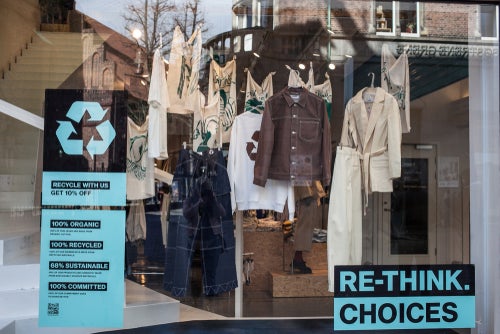
The survey, which questioned almost 5,000 US active and casual lifestyle brand consumers aged 18-55, suggests sustainability remains important for most (81%), but inflation and price increases on everyday goods, such as fashion means 63% are now regularly considering pre-owned and secondhand goods.
Lower priorities for this year compared to last year include style (38% versus 43% a year ago), innovation (20% versus 23% a year ago), and trendiness (18% versus 20% a year ago).

Discover B2B Marketing That Performs
Combine business intelligence and editorial excellence to reach engaged professionals across 36 leading media platforms.
Good value (69% versus 67%), low price (52% versus 45%) and durability (51% versus flat a year ago) are taking priority when purchasing active/casual lifestyle brands for the majority.
In saying this, the report, which was conducted with business intelligence company Morning Consult, found over half of consumers (56%) still look for information about a brand’s sustainability practice when considering a purchase. Plus, 71% still consider sustainability factors when choosing between brands and almost three-fifths (58%) have purchased a new product based on its sustainability factors.
Jim Duffy, managing director and sports and lifestyle brands analyst at Stifel, explains: “Sustainability plays heavily into purchasing behaviours for an overwhelming majority of US consumers, and especially so for younger, Generation Z shoppers.
“With inflation, however, we are being asked to pay more for everything. This is testing resolve for consumer willingness to pay a premium for brand attributes including leading sustainability practices.”

US Tariffs are shifting - will you react or anticipate?
Don’t let policy changes catch you off guard. Stay proactive with real-time data and expert analysis.
By GlobalDataSustainability priorities for US consumers in a high inflation climate
US consumers in 2022 regard giving workers fair pay and benefits (58%), supporting racial equality (43%) and protecting local environments and ecosystems (39%) as very important.
The report suggests the economic challenges facing consumers this year have resulted in two-fifths (41%) of consumers making the assumption that a brand’s motives is based on profits. Plus, less than half of consumers believe brands are increasing their focus on social issues and positive community influence (44%), compared to over half in 2021 (57%).
Global findings from the report
The survey also questioned over 5,000 consumers in five other countries, UK, Italy, Germany, France, and China, aged 18-55, and found most consumers continue to prioritise sustainability but the relative preference does differ by market.
Across all markets, four-fifths of active/casual lifestyle brand purchasers say it is important that brands operate with environmental, social and ethical business practices.
The survey also reveals that Chinese consumers are placing growing importance on sustainability. In fact, it suggests that more Chinese consumers are calling on brands to achieve carbon neutrality, prioritise recycling, protect human rights within the global supply chain and give workers fair pay and benefits compared to last year.
Both Italian (29%) and German (29%) consumers are the most likely to pay more for brands with leading sustainability practices and this has remained steady from last year. However, the US, UK, France, and China are less likely to pay a premium for sustainability versus last year, alongside other falling priorities for premium spending.
French consumers are still most likely of all markets to prioritise sustainability when shopping for active/casual lifestyle brands (59%) and look for information about a brand’s sustainability credentials (61%).





